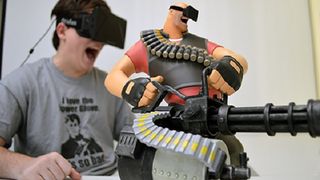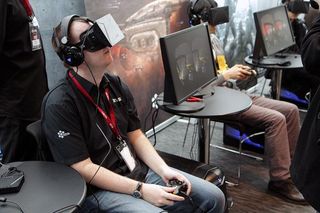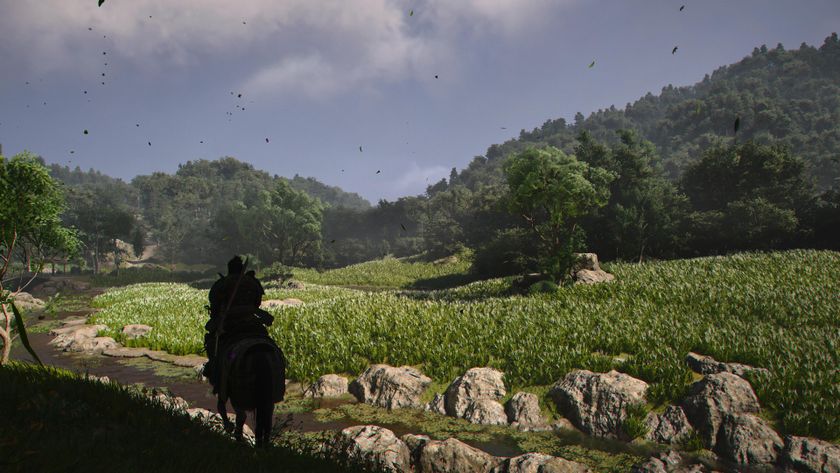The time for virtual reality is now
How VR has evolved, and why you should care about its future
So far, Oculus VR has sold more than 20,000 Rift development kits, with interested parties hailing from both indie and AAA developers. From a roller coaster simulator to the bizarre guillotine sim, the Rift has paved the way for a variety of experiences that just don't have the same effect when watching them unfold on a television. And one of the biggest hurdles that the VR space faces isn't the technology, but the unique style of content that can only come from these developers.
"If no one makes games for Oculus, then no one's going to buy it, and if no one buys it, no one will make games, and it gets into this weird chicken and egg thing," says Andrew Robinson, an artist at CCP Games.

The developers at CCP, creators of EVE Online and Dust 514, received their Oculus Rift dev kit in early March 2013, and immediately began toying around with the device. "Our expectations were pretty high," says Siggy Gunnarsson, a CCP programmer. "Everyone who hears about the Oculus is pretty skeptical...but the immersion factor just blew us away. We were just like kids opening presents at Christmas."
So CCP began development on its first VR title, Eve-VR, a multiplayer dogfighting game set in space--not because it was expected to yield huge profits, but because the team was genuinely excited about what VR could offer. So excited, in fact, that they set a lofty goal: to finish a playable prototype in time to take it to the Eve Online Fanfest in Reykjavik, Iceland. At the time, it was a mere seven weeks out.
"When we had the Rift in our hands and we started putting stuff in engine and checking it out and trying it, things fell into place very quickly," Robinson says. "And that's when we went crazy to finish it for Fanfest. It was seven weeks of days and nights and weekends to make it happen, but we made it happen for the players who traveled out to see us first and foremost."

I got a chance to sit down and play Eve-VR during E3 in June, and I can honestly say it was refreshing to play something so... different. The demo was brief--it lasted a whopping three minutes--but piloting a spaceship with a gamepad while using my head to look past its cockpit out into the infinite vastness of space left a lasting impression. It was easily one of the most memorable things I saw there. Let's not forget, this was the same E3 where I got my hands on two brand new consoles.
While virtual reality will undoubtedly open the floodgates into entirely new genres of games--Gunnarsson said one Eve-VR player coined the phrase "in-person gaming," a new perspective unique to VR--it has a rather daunting set of development challenges. For starters, we're used to staring at screens and manipulating camera controls with thumbsticks or a mouse. Using a head-mounted display that tracks movement is a whole different beast, and Robinson says it can be difficult to train players to use that tech properly.
Sign up to the GamesRadar+ Newsletter
Weekly digests, tales from the communities you love, and more

"We had a lot of people who were just looking straight forward at the screen as if they were playing a game on a monitor," he says. "We were starting to think, how could we get them to move their head around, how could we get them to use this Oculus hardware in a way that we were not physically saying to them, 'please, sir, move your head around,' but were saying, 'OK, this is a design in the game, it's a principle, a mechanic hook that really gets you to look around."
And, because you're wearing a physical device that affects your entire field of vision, the whole experience can be extremely disorienting if not handled properly.
"Motion sickness is another concern we have all the time," Gunnarsson says. "We were trying to look at things to combat that. One of the things is that because [in Eve-VR] you sit in a cockpit, you always have this static visual reference around you, and that feels familiar because you're used to sitting in a car."

Luckey has noticed another recurring issue during his time working on the Rift: "One thing we've found is that a lot of things that are really over exaggerated in a lot of games, because you're trying to get the message across or illicit some kind of reaction, seem really ridiculous once you're actually in VR, once you feel like you're actually there," he says. "It's kind of the difference between watching a stage performance where everything's overacted--but if you were to actually talk to someone who acted like that in real life, you would be very confused."
But the biggest challenge VR must overcome? Mass adoption. My friends can hardly be bothered to put on 3D glasses to play 3D games on their 3D TVs, let alone suit up in cumbersome VR equipment. And even if they were willing to do so, virtual reality is an isolating experience because it requires your undivided attention. You can't just divert your eyes away from a screen to talk your friends or family. When you're in, you're in, and you're there by yourself.
"It could be what it takes for virtual reality to be successful is for it to be moved to the point where it's not an isolating thing, it's something that brings people together," Luckey says. "But I do think within ten years we have a good shot of creating virtual reality technology that allows you to make an experience that is nearly indistinguishable from reality."

So, no, we're not at the stage where we can "plug in" a la The Matrix. Even after decades of technological advancement, your imagination will still have to work to fill in the gaps. But you'd be amazed at how easy it is to ignore VR's current shortcomings in exchange for a level of immersion that used to only exist in the pages of science fiction. And for folks like the devs at CCP, the tech is--at last--at a point where they can finally begin creating the types of games that will lay the foundation of virtual reality's future.
"No one has really written the book on [VR games] yet, there's so much unexplored territory for what works and what doesn't work," Gunnarsson says. "There's a lot of progress still to be made. We are all gamers ourselves, and we want to see more VR games, and that's also a part of why we're doing this--we're just trying to help get things started."
Ryan was once the Executive Editor of GamesRadar, before moving into the world of games development. He worked as a Brand Manager at EA, and then at Bethesda Softworks, before moving to 2K. He briefly went back to EA and is now the Director of Global Marketing Strategy at 2K.

Assassin's Creed Shadows devs "actively looking at" an even harder difficulty mode for the RPG: "How challenging do you want it?"

Assassin's Creed Shadows' delays were mostly used to polish the RPG, creative director confirms, not for deeper changes brought about by Star Wars Outlaws reaction











